pleasant 和pleasing的区别可以概括如下
- 格式:doc
- 大小:24.00 KB
- 文档页数:1

pleasant pleasure pleased的区别摘要:1.简介三个单词的词义2.区分三个单词的用法3.实例说明三个单词的运用4.总结:如何在不同情境下选择合适的单词正文:在学习英语的过程中,我们经常会遇到一些形近的单词,它们在意义上有一定的相似之处,但在用法上又有区别。
今天,我们就来探讨一下"pleasant","pleasure"和"pleased"这三个单词的区别和用法。
首先,我们来了解一下这三个单词的基本含义。
"pleasant"(愉快的)强调的是一种氛围或感觉,比如一个地方的气候、风景等给人带来的愉悦感受。
例如:The pleasant weather made our trip more enjoyable.(宜人的天气使我们的旅行更加愉快。
)"pleasure"(快乐、乐趣)则强调的是某件事或某个活动本身给人带来的快乐。
例如:I derive great pleasure from reading.(我从阅读中得到极大的乐趣。
)"pleased"(高兴、满意)则是指某人对某件事表示满意或感到高兴。
例如:She was pleased with her performance in the competition.(她对自己的比赛表现感到满意。
)接下来,我们来看一下这三个单词在用法上的区别。
首先,"pleasant"和"pleasure"都是形容词,可以用来描述事物。
但"pleasant"更多用于描述氛围、环境等,而"pleasure"则更多用于描述人的感受。
同时,"pleasure"还可以用作名词,表示快乐、乐趣。
例如:He seeks pleasure in gambling.(他寻求赌博的乐趣。
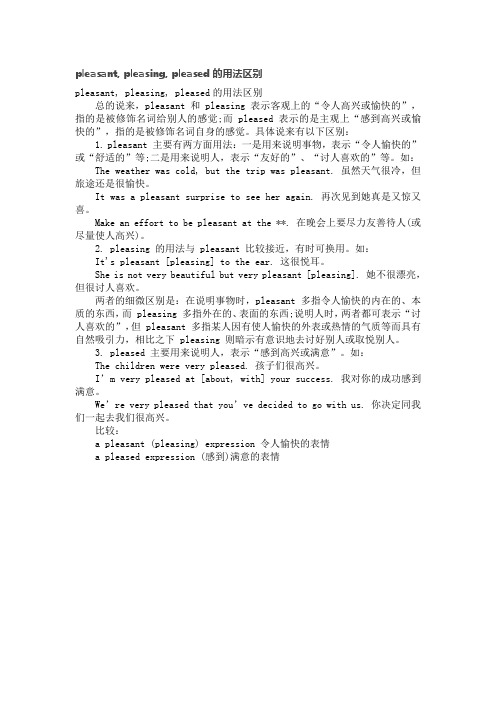
pleasant, pleasing, pleased的用法区别pleasant, pleasing, pleased的用法区别总的说来,pleasant 和 pleasing 表示客观上的“令人高兴或愉快的”,指的是被修饰名词给别人的感觉;而 pleased 表示的是主观上“感到高兴或愉快的”,指的是被修饰名词自身的感觉。
具体说来有以下区别:1. pleasant 主要有两方面用法:一是用来说明事物,表示“令人愉快的”或“舒适的”等;二是用来说明人,表示“友好的”、“讨人喜欢的”等。
如:The weather was cold, but the trip was pleasant. 虽然天气很冷,但旅途还是很愉快。
It was a pleasant surprise to see her again. 再次见到她真是又惊又喜。
Make an effort to be pleasant at the **. 在晚会上要尽力友善待人(或尽量使人高兴)。
2. pleasing 的用法与 pleasant 比较接近,有时可换用。
如:It's pleasant [pleasing] to the ear. 这很悦耳。
She is not very beautiful but very pleasant [pleasing]. 她不很漂亮,但很讨人喜欢。
两者的细微区别是:在说明事物时,pleasant 多指令人愉快的内在的、本质的东西,而 pleasing 多指外在的、表面的东西;说明人时,两者都可表示“讨人喜欢的”,但 pleasant 多指某人因有使人愉快的外表或热情的气质等而具有自然吸引力,相比之下 pleasing 则暗示有意识地去讨好别人或取悦别人。
3. pleased 主要用来说明人,表示“感到高兴或满意”。
如:The children were very pleased. 孩子们很高兴。
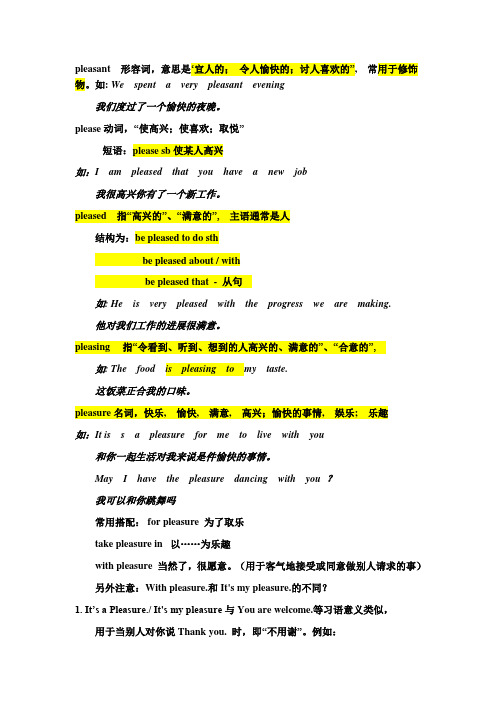
pleasant形容词,意思是‘宜人的;令人愉快的;讨人喜欢的”,常用于修饰物。
如: We spent a very pleasant evening我们度过了一个愉快的夜晚。
please 动词,“使高兴;使喜欢;取悦”短语:please sb 使某人高兴如:I am pleased that you have a new job我很高兴你有了一个新工作。
pleased指“高兴的”、“满意的”,主语通常是人结构为:be pleased to do sthbe pleased about / withbe pleased that - 从句如: He is very pleased with the progress we are making.他对我们工作的进展很满意。
pleasing指“令看到、听到、想到的人高兴的、满意的”、“合意的”,如: The food is pleasing to my taste.这饭菜正合我的口味。
pleasure名词,快乐,愉快,满意,高兴;愉快的事情,娱乐;乐趣如:It is s a pleasure for me to live with you和你一起生活对我来说是件愉快的事情。
May I have the pleasure dancing with you ?我可以和你跳舞吗常用搭配: for pleasure 为了取乐take pleasure in 以……为乐趣with pleasure 当然了,很愿意。
(用于客气地接受或同意做别人请求的事)另外注意:With pleasure.和It's my pleasure.的不同?1. It’s a Pleasure./ It's my pleasure与You are welcome.等习语意义类似,用于当别人对你说Thank you. 时,即“不用谢”。
例如:-Thank you for coming to see me .-It’s a pleasure.-谢谢你来看我.-不用谢。
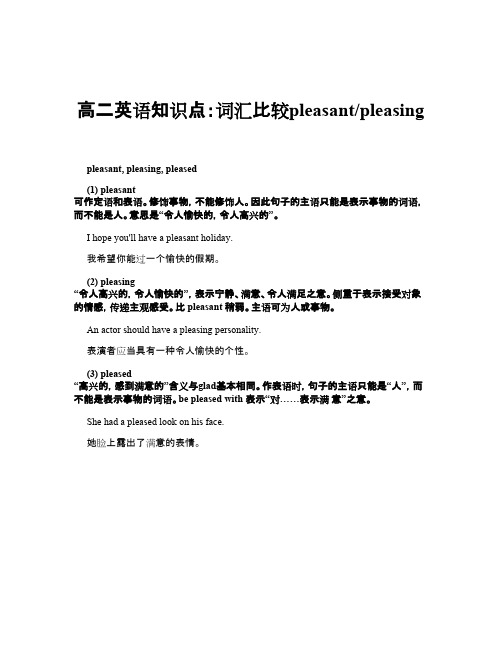
高二英语知识点:词汇比较pleasant/pleasing
pleasant, pleasing, pleased
(1) pleasant
可作定语和表语。
修饰事物,不能修饰人。
因此句子的主语只能是表示事物的词语,而不能是人。
意思是“令人愉快的,令人高兴的”。
I hope you'll have a pleasant holiday.
我希望你能过一个愉快的假期。
(2) pleasing
“令人高兴的,令人愉快的”,表示宁静、满意、令人满足之意。
侧重于表示接受对象的情感,传递主观感受。
比 pleasant 稍弱。
主语可为人或事物。
An actor should have a pleasing personality.
表演者应当具有一种令人愉快的个性。
(3) pleased
“高兴的,感到满意的”含义与glad基本相同。
作表语时,句子的主语只能是“人”,而不能是表示事物的词语。
be pleased with 表示“对……表示满意”之意。
She had a pleased look on his face.
她脸上露出了满意的表情。
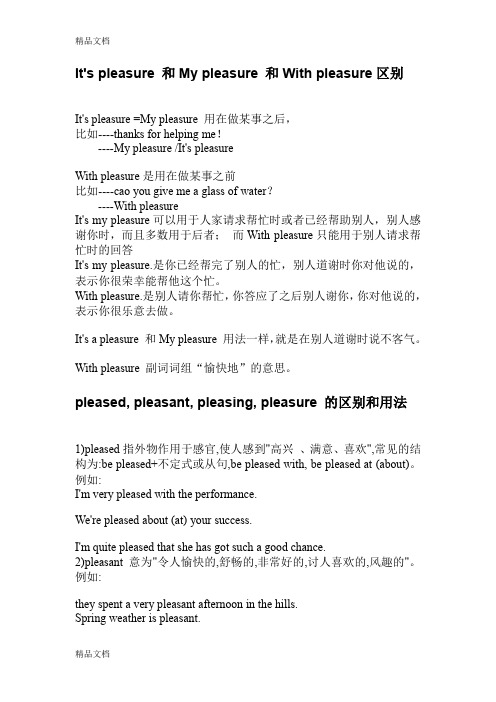
It's pleasure 和My pleasure 和With pleasure区别It's pleasure =My pleasure 用在做某事之后,比如----thanks for helping me!----My pleasure /It's pleasureWith pleasure是用在做某事之前比如----cao you give me a glass of water?----With pleasureIt's my pleasure可以用于人家请求帮忙时或者已经帮助别人,别人感谢你时,而且多数用于后者;而With pleasure只能用于别人请求帮忙时的回答It's my pleasure.是你已经帮完了别人的忙,别人道谢时你对他说的,表示你很荣幸能帮他这个忙。
With pleasure.是别人请你帮忙,你答应了之后别人谢你,你对他说的,表示你很乐意去做。
It's a pleasure 和My pleasure 用法一样,就是在别人道谢时说不客气。
With pleasure 副词词组“愉快地”的意思。
pleased, pleasant, pleasing, pleasure 的区别和用法1)pleased指外物作用于感官,使人感到"高兴、满意、喜欢",常见的结构为:be pleased+不定式或从句,be pleased with, be pleased at (about)。
例如:I'm very pleased with the performance.We're pleased about (at) your success.I'm quite pleased that she has got such a good chance.2)pleasant意为"令人愉快的,舒畅的,非常好的,讨人喜欢的,风趣的"。
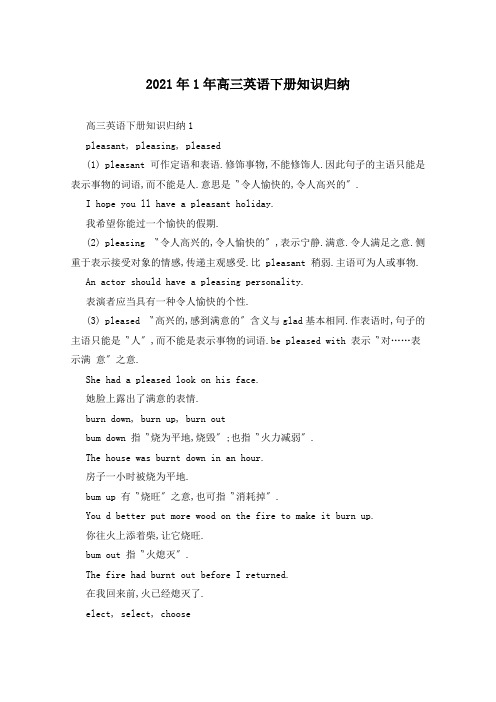
2021年1年高三英语下册知识归纳高三英语下册知识归纳1pleasant, pleasing, pleased(1) pleasant 可作定语和表语.修饰事物,不能修饰人.因此句子的主语只能是表示事物的词语,而不能是人.意思是〝令人愉快的,令人高兴的〞.I hope you ll have a pleasant holiday.我希望你能过一个愉快的假期.(2) pleasing 〝令人高兴的,令人愉快的〞,表示宁静.满意.令人满足之意.侧重于表示接受对象的情感,传递主观感受.比 pleasant 稍弱.主语可为人或事物. An actor should have a pleasing personality.表演者应当具有一种令人愉快的个性.(3) pleased 〝高兴的,感到满意的〞含义与glad基本相同.作表语时,句子的主语只能是〝人〞,而不能是表示事物的词语.be pleased with 表示〝对……表示满意〞之意.She had a pleased look on his face.她脸上露出了满意的表情.burn down, burn up, burn outbum down 指〝烧为平地,烧毁〞;也指〝火力减弱〞.The house was burnt down in an hour.房子一小时被烧为平地.bum up 有〝烧旺〞之意,也可指〝消耗掉〞.You d better put more wood on the fire to make it burn up.你往火上添着柴,让它烧旺.bum out 指〝火熄灭〞.The fire had burnt out before I returned.在我回来前,火已经熄灭了.elect, select, chooseelect 只能用于选举人,是投票选举的正式用语.They elected Ni_on President. 他们选尼克松为总统.choose 可用于挑选人或物.It s hard for me to choose one from so many pairs of shoes.要从这么多双鞋子当中挑选一双对我来说真是太难了.select 意为精心挑选,多用于物.She selected a pair of socks to match her suit.他精心挑选了一双袜子来与衣服搭配.be known for, be known as, be known tobe known for 以……出了名 (通常不是指同位的关系)be known as 作为……出了名 (通常加上职业名词,表同位关系)be known to为……所知Japan is known for its cars.日本以它的汽车而闻名.Lu_un is known as a writer.鲁迅作为作家很出名.As is known to all, China has four famous invitations.众所周知,中国有四大的发明.observe, watch当〝观察〞来讲时,observe相当于watch carefully,尤其用于实验或研究等场合.具体来说,observe含有〝察觉到〞的意思,watch意为〝盯着看〞.watch还含有〝观看(比赛.电视)〞等,而observe没有此意.另外,watch还有〝照料〞之意,相当于take care of.还有〝当心〞之意,相当于be careful with. She has observed the stars all her life.她一生都在观察星星.I ll watch the baby while you are away.你不在时,由我照料你女儿.You d better watch Mr Smith, I think he is a thief.你当心史密斯先生,我想他是个贼.高三英语下册知识归纳2虚拟语气在一些特殊词中的使用或含蓄条件句1.wish后的宾语从句.与现在愿望不一致,用主语十过去时,例如:I wi.hIwere you.与过去愿望不一致,用主语+had+过去分词,例如:Iwish I had visited the White House whenI was in the States与将来愿望不一致,用主语+would (could)+原形.2.It s time句型:当lt s tine后用that从句时应该为主i吾+should+动词原形或主语十过去时,例如:It,s time thatyou went to school.或It s time that you should go to schooL3- If only引起的感叹句相当于〝How I wish+宾语从句〞.(l)If only he could come.他要能来就好了.(2)If only I had known the answer.我要早知道答案就好了.4.WOuld rather,as if(though)引导的从句也需使用虚拟语气,表示过去的情况用过去完成时,表示现在与将来的情况用过去时,例如:(l)I d rather you posted the letter right away.(2)She loves the children as if they were hers.5.含蓄虚拟条件句含蓄条件句是指句中没有明显的虚拟条件句,而是利用其他手段来暗示存在虚拟条件.但是这类隐含式虚拟条件句往往都可以转化为if引导的条件句.常用来表示含蓄虚拟条件的手段有:(1)介词或介词短语.如but for,but that,without,in case of, under more favorable condition等.(2)连词.如so that, unless, in case, supposing,lest, provided(倘若……),for fear that(唯恐),in orderthat, on condition that, if only(要是……就好了)等.注意:lest, for fear that和in case引起的从句中谓语动词多用should+动词原形,但也可以不用虚拟语气,而用动词的陈述语气形式.例如:The foreign teacher spokeslowly in case we misunderstood him这位外籍教师说得很慢以免我们误解.(3)通过上下文及内在含义,句中往往有but,otherwise, unfortunately等类似转折词.without, but. but for, otherwise引起的短语或句子常暗含着含蓄条件.例如:①Without you,1 woul d never know him②But for your oooperation, we wouldn t have done it③But that she was afraid, she would have said no. .④i would be most glad to help you, butI am busy now.⑤I would have come to the party yesterday, but ljwas working.⑥I am busy now, otherwise l would do you the favor!高三英语下册知识归纳3look up the dictionary汉语中的〝查字典〞,说成英语通常是 look up sth in a dictionary 或consult [refer to] a dictionary.如:I refer to the dictionary frequently. 我经常查阅词典.You can look the word up in the dictionary. 你可以在词典里查这个词. He often consulted a dictionary when he read the book. 他读这本书时经常查字典.I looked the word up in the dictionary to refresh my memory of its e_act meaning. 我查了词典,以便弄清这个词的准确意思.I often look up the words I don’t know in the dictionary or on the Internet. 我经常在字典里或网上查找我不认识的单词.〝Is that the correct spelling?〞〝I don’t know—look it up in a dictionary.〞〝那是正确的拼写吗?〞〝我不知道——查查词典吧.〞I didn’t know what 〝loquacious〞 meant and had to look it up in adictionary. 我不知道loquacious这个是什么意思,所以只好查了词典.有不少人认为英语习惯上不能直接说 look up the dictionary, 其实这种表达在英语中也可以用,只是比较少见而已.例如:I spend more time looking up the dictionary than reading the book. 我读这本书时查字典的时间还多些.——摘自 L. G. Ale_ander 编《新概念英语》(外研社)Look up the dictionary and e_plain the meaning of the italicized words. 查字典然后解释斜体词的意思.——摘自张汉熙编《高级英语》(商务印书馆) 高三英语下册知识归纳。
pleasant形容词,意思是‘合意的令人愉快的、讨人喜欢的”,常用于修饰物。
如: We spent a very pleasant evening我们度过了一个愉快的夜晚。
please 动词,“使高兴;使喜欢;取悦”短语:please sb 使某人高兴如:I am pleased that you have a new job我很高兴你有了一个新工作。
pleased指“高兴的”、“满意的”,主语通常是人结构为:be pleased to do sthbe pleased about / withbe pleased that - 从句如: He is very pleased with the progress we are making。
他对我们工作的进展很满意。
pleasing 指“令人愉快的”、“合意的”,如: The food is pleasing to my taste这饭菜正合我的口味。
pleasure名词,快乐, 愉快, 满意, 高兴;愉快的事情, 娱乐; 乐趣如:It is s a pleasure for me to live with you和你一起生活对我来说是件愉快的事情。
May I have the pleasure dancing with you我可以和你跳舞吗常用搭配:for pleasure 为了取乐take pleasure in 以。
为乐趣with pleasure 当然了,很愿意。
(用于客气地接受或同意做别人请求的事)另外注意:With pleasure.和It's my pleasure.的不同1. It’s a Pleasure./ It's my pleasure与You are welcome.等习语意义相同,用于当别人对你说Thank you. 时,即“不用谢”。
例如:-Thank you for coming to see me .-It’s a pleasure.-谢谢你来看我.-不用谢。
英语中pleasant和pleased都是由please派生出来的形容词,但是这两个词在用法上有所不同,使用时请注意区分。
Pleasant的意思是“令人愉快的,舒适的,合意的”。
可形容人,也可形容物。
例句1:The weather here in winter is pleasant.这里的冬天气候宜人。
例句2:It is a pleasant office to work in.在这个办公室里工作很舒适。
例句3:I spent a pleasant day with my friends.我与朋友们度过了愉快的一天。
Pleasant 形容人时,指人的外貌、气质、举止、态度等让人喜欢。
例句4:He tried to make himself pleasant to everybody.他努力给大家留下好印象。
例句5: The new teacher is a pleasant young girl.新来的老师是个讨人喜欢的年轻女孩。
Pleased 的意思是“感到高兴,满意”。
例句6:He had a pleased look on his face.他脸上露出满意的神情。
例句7: I am very pleased about the result.我对结果很满意。
例句8:The teacher is quite pleased with the student’s performance.老师对学生们的表现十分满意。
Pleasant 的同义词是nice, enjoyable, friendly; pleased 的同义词是happy, contented.a pleasant smile: 悦人的微笑;a pleased smile: 喜悦的微笑a pleasant voice: 悦耳的声音;a pleased voice: 高兴的声音。
pleasant形容词,意思是‘合意的令人愉快的、讨人喜欢的”,常用于修饰物。
如: We spent a very pleasant evening我们度过了一个愉快的夜晚。
please 动词,“使高兴;使喜欢;取悦”短语:please sb 使某人高兴如:I am pleased that you have a new job我很高兴你有了一个新工作。
pleased指“高兴的”、“满意的”,主语通常是人结构为:be pleased to do sthbe pleased about / withbe pleased that - 从句如: He is very pleased with the progress we are making。
他对我们工作的进展很满意。
pleasing指“令人愉快的”、“合意的”,如: The food is pleasing to my taste这饭菜正合我的口味。
pleasure名词,快乐,愉快,满意,高兴;愉快的事情,娱乐;乐趣如:It is s a pleasure for me to live with you和你一起生活对我来说是件愉快的事情。
May I have the pleasure dancing with you ?我可以和你跳舞吗常用搭配:for pleasure 为了取乐take pleasure in 以。
为乐趣with pleasure 当然了,很愿意。
(用于客气地接受或同意做别人请求的事)另外注意:With pleasure.和It's my pleasure.的不同?1. It’s a Pleasure./ It's my pleasure与You are welcome.等习语意义相同,用于当别人对你说Thank you. 时,即“不用谢”。
例如:-Thank you for coming to see me .-It’s a pleasure.-谢谢你来看我.-不用谢。
pleasant, pleased, pleasing, please, pleasure的区别:①pleasant主要有两方面用法:一是用来说明事物,表示“令人愉快的”或“舒适的”等;二是用来说明人,表示“友好的”、“讨人喜欢的”等。
强调“所形容的人或物有给予愉快的性质”。
如:The weather was cold, but the trip was pleasant. 虽然天气很冷,但旅途还是很愉快。
It was a pleasant surprise to see her again. 再次见到她真是又惊又喜。
Make an effort to be pleasant at the party. 在晚会上要尽力友善待人(或尽量使人高兴)。
②pleasing的用法与pleasant 比较接近,有时可换用。
如:It’s pleasant [pleasing] to the ear. 这很悦耳。
She is not very beautiful but very pleasant [pleasing]. 她不很漂亮,但很讨人喜欢。
注:两者的细微区别是:在说明事物时,pleasant多指令人愉快的内在的、本质的东西,而pleasing多指外在的、表面的东西;说明人时,两者都可表示“讨人喜欢的”,但pleasant 多指某人因有使人愉快的外表或热情的气质等而具有自然吸引力,相比之下pleasing则暗示有意识地去讨好别人或取悦别人。
③pleased一般用作表语,偶而也作定语,但所修饰的名词往往是表示人的感情、态度、表情等方面的名词,用于表示说话人自己的立场,指某事使人非常高兴而产生一种结果,作表语时意思是“高兴的”、“喜欢的”,含义glad基本相同,因此句子的主语只能是“人”,后接at doing sth, with sth,不定式或that从句;④please是动词,可作及物动词,表示“使高兴(满意、愉快)”,也可作不及物动词,表示高兴、愉快等,回答Would you like some water?等表示征求意见的问题时,如同意,要说Yes, please.且用升调;⑤pleasure是动词please的派生名词,表示“愉快、高兴、满意、喜欢”之意,多用于口语,当你帮他人受到对方感谢,你应说:It’s a pleasure.或 A pleasure. 当别人请你帮忙,你乐意做时,则应说:With pleasure. 告诉他人坏消息时, 应用: It gives me no pleasure to have to tell you this. 表示本来不愿意,但不得不用的客套话,写信时常用: I take pleasure in sending you my photo. / It gives me pleasure to send you my photo.等表达I’m sending you my photo的意思, 请人吃饭可说: Will you do the pleasure of dinning with me?例句:It is a pleasant season.这是一个令人愉快的季节。